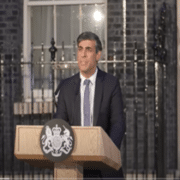Think Twice Before you Declare a Crisis
Last Wednesday, Prime Minister Rishi Sunak held a shock press conference to denounce mob rule and threats to democracy on the streets of Britain. For a previously mildly spoken technocrat this was a big departure.
The statement appeared to be prompted by the Rochdale by-election which everyone admits was messy. But whilst it is clear we are seeing an increase in anger at the political classes, and social media algorithms have for years been encouraging people into more extreme positions, it is hard to see what made last Wednesday the moment to announce that democracy and the rule of law were under threat.
Many have noted that while there is clearly considerable conflict over the situation in Gaza, which has lead to protests in the UK, plus genuine concern about the rise in death threats for MPs and the trend to protest outside the homes of elected representatives, it seems difficult to evidence Sunak’s warning on ‘mob rule’.
As a cynic, I would suggest that the speech, including the extensive reference about what it means to be British, smacks more of election-year politics than of a sudden escalation in threat.
War, terrorism and serious immediate crisis like 9/11 in the US and 7/7 in the UK and of course 7th October in Israel, whilst appalling in their own right, create both a political threat to the current leaders, and a moment when they can act more decisively and more immediately (or perhaps extremely), than they can in normal times. One doesn’t have to agree with everything argued by Naomi Klein in the 2009 book Shock Doctrine, to recognise this basic premise.
A crisis, a common threat, the enemy at the gate, all provide opportunities for leaders.
Therefore, it’s no surprise that there’s a temptation to talk up a threat, in order to consolidate or hold on to power. But it is a dangerous strategy. It is often far too obvious. And if it fails the leader loses credibility.
I am not the only one to question, where is the evidence for the immediate threat. Here are some cuttings.
Downing Street Fails to Provide Evidence to back up Rishi Sunak’s mob rule claim is the Huffington Post headline.
The Prime Minister’s speech about peaceful protests is deeply worrying says Amnesty International
Tories accused of using ‘mob rule’ claims to justify restricting protests writes the Guardian.
One of the privileges of my work is I spend quality time with senior leaders in many different sectors. I cannot think of one who would jump to declare a crisis or moment of high jeopardy, without very serious consideration and a watertight argument. They would all fear that it would do more to hurt their leadership than consolidate it.
- A Behind-the-Scenes TV Cheat… and Why It Works - November 26, 2025
- What Should I Do With My Hands? - November 19, 2025
- A Jar of Marbles and the Power of a Simple Story - November 12, 2025




Leave a Reply
Want to join the discussion?Feel free to contribute!